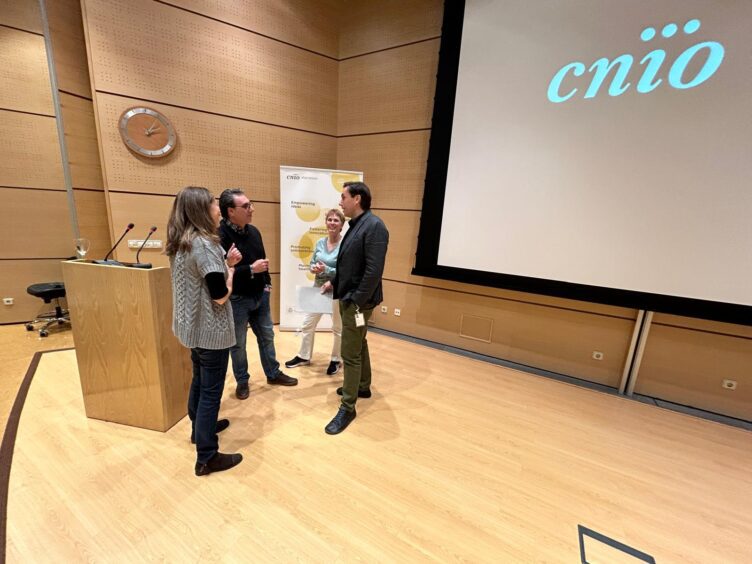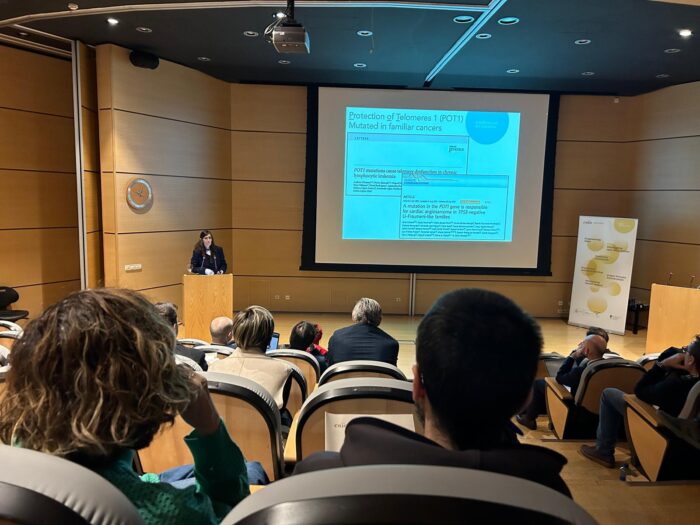This website uses cookies so that we can provide you with the best user experience possible. Cookie information is stored in your browser and performs functions such as recognising you when you return to our website and helping our team to understand which sections of the website you find most interesting and useful.
 From the left: Sonia Martínez, Joaquín Pastor y Carmen Blanco, researchers of the Experimental Therapies program at CNIO, with Roke Oruezabal, from CNIO’s Innovation program. / E. Sánchez. CNIO
From the left: Sonia Martínez, Joaquín Pastor y Carmen Blanco, researchers of the Experimental Therapies program at CNIO, with Roke Oruezabal, from CNIO’s Innovation program. / E. Sánchez. CNIO
‘CNIO Investors Day’ aims to promote contact between leaders in cancer science and agents of the productive fabric, one of the pending issues of the Spanish R&D&I system.
A stool test for pancreatic cancer diagnosis; a gene editing tool against pediatric cancer; and a platform for testing drugs on patient samples, among the projects presented.
Some of the firms at the event were Ysios Capital; Asabys Partners; In Vivo Capital; Adbio Partners; Criteria Bio Ventures; and Clave Capital.
We bring together "basic research and the pharmaceutical industry," Joaquín Pastor, director of the CNIO's Experimental Therapeutics program, said at the Investors Day.
A dozen venture capital firms, as well as funding and consulting firms, have listened carefully to the ideas of some of Spain’s best cancer researchers, scientists from the Spanish National Cancer Research Center (CNIO), to turn their scientific results into tangible advances for patients.
It was at the CNIO Investors Day, an event to promote ties between knowledge generators and agents of the productive fabric.
Among the projects presented are a stool test for pancreatic cancer diagnosis; a gene-editing tool for pediatric cancer; a platform for testing drugs on patient samples and personalizing treatment; potential new therapeutic compounds; and an algorithm for designing diets to help cancer patients.
These ideas are “the most translational initiatives with the greatest possible immediate impact” by international leaders in cancer research, said Roke Oruezabal, CNIO’s Director of Innovation and organizer of this first CNIO Investors Day, which was in practice a ‘casting call’ for highly innovative ideas in health.
Investors in biomedicine
The aims were threefold: to encourage researchers to consider entrepreneurship; to expose the CNIO’s technological offer to the main biomedical investment companies; and to generate public-private collaborations. In addition to renowned investment companies, consultants and funding entities also participated.
“At the CNIO we do our best to ensure that the results of excellent research reach the clinic as soon as possible,” said Oruezabal. “For that, it is key to bring those who have the knowledge closer to the business builders of the Spanish biotech ecosystem, those capable of turning projects that could really improve the lives of patients into reality.”
Some of the firms at the event were Ysios Capital; Asabys Partners; In Vivo Capital; Adbio Partners; Criteria Bio Ventures; y Clave Capital.
Over 5.6 million from agreements with companies and patents
“The CNIO is one of the top ten cancer research centers by scientific output on a global scale and is also a leader in innovation, with developments that may lead to new drugs and therapies,” said Maria A. Blasco, CNIO director and author of a project to develop a new type of compounds that target the telomeres of tumor cells.
In 2023 alone, the CNIO earned more than four million euros in revenue from public-private collaboration agreements with some of the leading biotech-pharmaceutical companies on a global scale, 66% more than the previous year.
Patent licensing by CNIO researchers also generated 1.6 million, 23% more than in 2022.
Two spin-off companies have been created in recent years, one on personalized diets for cancer patients and the other on the use of genetic engineering to treat pulmonary fibrosis, and several more companies are in the pipeline.
Embryos for new drugs at the CNIO
The CNIO is the only research center in Spain capable of producing chemical compounds from the results of research at the center that are potential new drugs.
Researchers identify molecular targets on which to act chemically, and the CNIO’s Experimental Therapeutics program generates compounds capable of achieving a therapeutic effect. Once patented, the pharmaceutical industry can move forward with their development; it will take more than a decade before the drug candidate, if it passes all phases, reaches patients.
As an example, in 2022, the FDA in USA granted a compound developed and patented at the CNIO designation as a rare pediatric disease drug for the treatment of neuroblastoma tumor.
“We are the bridge that links basic research with the pharmaceutical industry; we know both worlds and we know how to bring them together,” Joaquín Pastor, director of the CNIO’s Experimental Therapeutics program, said at the Investors Day.

